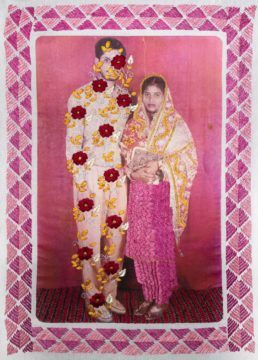Magali Nuzant in lensculture:
 The images are printed on khadi, the cloth produced by traditional spinning wheels—the charkha, a device that is deeply rooted in Indian history. During the struggle for independence, Mahatma Gandhi used the spinning wheel as a symbol of self-reliance, urging Indians to spin their own cloth as a means of gaining economic freedom from the exploitation of British colonizers. If the spinning wheel has come to be a symbol of self-reliance, then in the work of Malik, the act of embroidery embodies resistance and the strength and care that can be found in community. Behind the work lies the reality of the struggle for women’s rights and the issue of gendered violence in India.
The images are printed on khadi, the cloth produced by traditional spinning wheels—the charkha, a device that is deeply rooted in Indian history. During the struggle for independence, Mahatma Gandhi used the spinning wheel as a symbol of self-reliance, urging Indians to spin their own cloth as a means of gaining economic freedom from the exploitation of British colonizers. If the spinning wheel has come to be a symbol of self-reliance, then in the work of Malik, the act of embroidery embodies resistance and the strength and care that can be found in community. Behind the work lies the reality of the struggle for women’s rights and the issue of gendered violence in India.
“‘Nā́rī’ is a word that I’ve used all my life,” explains Malik. “There are multiple definitions that appear in Hindi: woman, wife, female, an object that is regarded as feminine, but it also means sacrifice. When I first read that, I started to read more about women in the time that the word was coined and all that women had to sacrifice throughout history, all the rituals that were part of the culture, that were built around this word.”
More here.
